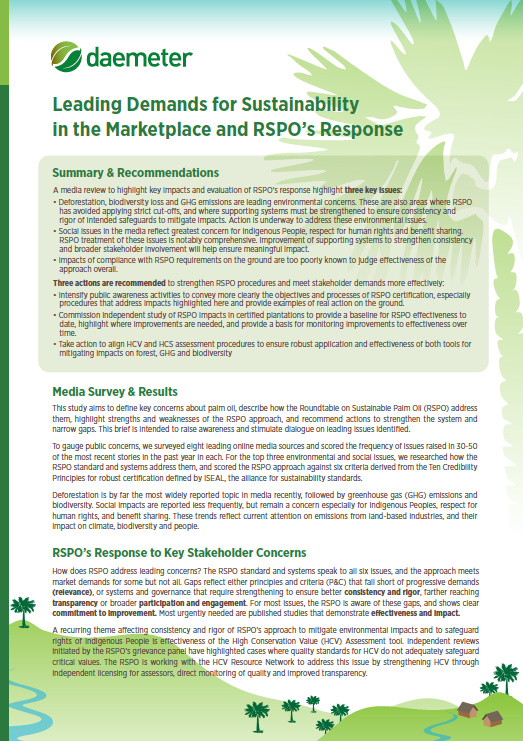
Leading Demands for Sustainability in the Marketplace and RSPO’s Response
Authors: Daemeter Consulting
Publisher: Daemeter Consulting
Sep 2014
We surveyed eight leading online media sources and scored the frequency of issues raised in 30-50 of the most recent stories in the past year in each. Deforestation is by far the most widely reported topic in media recently, followed by greenhouse gas (GHG) emissions and biodiversity. Social impacts are reported less frequently, but remain a concern especially for Indigenous Peoples, respect for human rights, and benefit sharing. These trends reflect current attention on emissions from land-based industries, and their impact on climate, biodiversity and people.
How does RSPO address leading concerns? The RSPO standard and systems speak to all six issues, and the approach meets market demands for some but not all. Gaps reflect either principles and criteria (P&C) that fall short of progressive demands (relevance), or systems and governance that require strengthening to ensure better consistency and rigor, farther reaching transparency or broader participation and engagement. For most issues, the RSPO is aware of these gaps, and shows clear commitment to improvement. Most urgently needed are published studies that demonstrate effectiveness and impact.
Three actions are recommended to strengthen RSPO procedures and meet stakeholder demands more effectively:
- Intensify public awareness activities to convey more clearly the objectives and processes of RSPO certification, especially procedures that address impacts highlighted here and provide examples of real action on the ground.
- Commission independent study of RSPO impacts in certified plantations to provide a baseline for RSPO effectiveness to date, highlight where improvements are needed, and provide a basis for monitoring improvements to effectiveness over time.
- Take action to align HCV and HCS assessment procedures to ensure robust application and effectiveness of both tools for mitigating impacts on forest, GHG and biodiversity.

